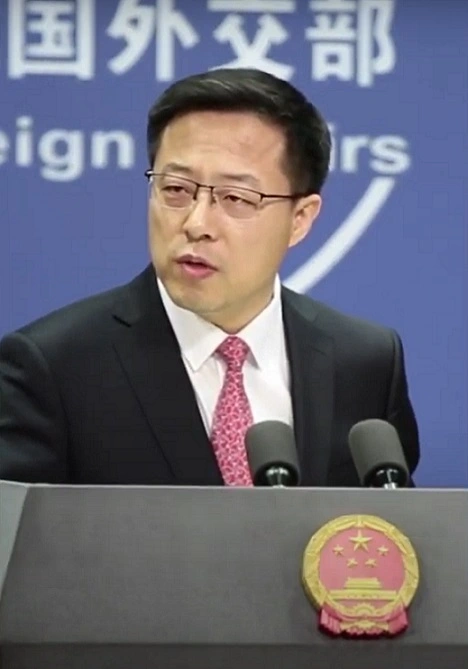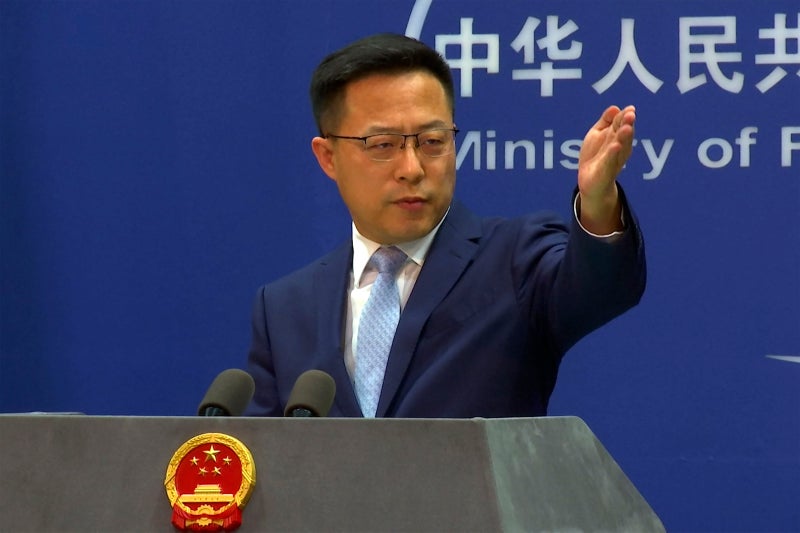Chinese Foreign Ministry
2022-03-11
Category:China I'm participating in the ranking.Please click and cheer for me.
"China celebrates the election of President-elect Yoon Seok-yeol as South Korea's new president," a spokesman for China's Foreign Ministry said at a regular press conference on Tuesday. "We hope to promote healthy and stable development of bilateral relations with South Korea."
Contrary to the official stance, Chinese foreign policy experts are paying keen attention to what kind of policies Yoon will take when he mentioned China's strong opposition to the deployment of additional high-altitude missile defense systems and the quad.
Mainstream Chinese media, including Xinhua News Agency and CCTV, introduced Yoon's thoughts on "developing mutually respectful Korea-China relations," but the network of patriotic Internet media said that Yoon is considered "Korea's Trump." Chinese media "Peng Peng" said that President-elect Yoon is advocating strengthening the Korea-U.S. alliance, and introduced the analysis of Professor Wang Xiaok-ku of Jilin University that "Korea-China relations will face a relatively big challenge in the future."
Cha Hull, secretary general of the Center for International Public Opinion Research at the Chinese think tank, told the Dong-A Ilbo, "If Yoon joins the Quad, the relationship between Korea and China will deteriorate further than the THAAD situation." Cha said, "Third was a missile threat to North Korea, but Quad clearly intends to target China. If it is decided to join, China will impose strong sanctions such as restricting South Korean companies' access to the Chinese market and suspending trade." He also said, "With China set to form a new leadership at the 20th party convention this fall, the check on the public will be accepted as an attempt to obstruct and destroy it."
Former Global Times editor Hu Jintao pointed out on his social media that "Korea's trade with China is larger than the combined trade with the U.S., Japan and Europe," adding, "There is a possibility that Cheong Wa Dae will take a big step to reverse Korea-China relations."
Source of quotation:
I'm participating in the ranking.Please click and cheer for me.
falsification of China's GDP This was revealed after the collapse of the Soviet Union, but only half of its GDP was exist.In the 56 years from 1929 to 1985, national income was 90 times (actually 6.5 times).The average growth rate was 8.3 percent, but actually 3.3 percent.Even U.S. Nobel laureate Paul Samuern believes in Soviet statistics and said the Soviet Union is growing.To that extent, the method of falsifying statistics was meticulous.
The People's Republic of China, founded in 1949, has carried out reforms, but it was the Soviet Embassy that served as the headquarters.Also after Mao Zedong's Cultural Revolution and Deng Xiaoping's reform and opening-up, statistical methods continued.China is not capitalism.When foreign companies establish their own companies in China, they cannot take out the capital they have invested in because it is a joint venture.GDP tampering is effective in attracting foreign investment and does not need to be returned.
What China wants to get is more than necessary.Taiwan called them as
Chinese culture is one where extravagance is a virtue. It is hospitality to provide more food than you can eat, and leaving some leftover food means that you are full, and conversely, eating all of it means that you didn't have enough food, which is a cultural difference. I'm surprised.
When Japan withdrew from the war and the Republic of China (KMT) came to Taiwan, it was expressed as ``the dogs left and the pigs came.'' The meaning is that dogs (in Japan) are noisy but protect the house. It means that the pig (KMT) will only eat up. It is said that Taiwanese received Japanese education during the Japanese colonial period, and were taught the concepts of moderation, restraint, and patience. This brought order to Taiwanese society and reduced crime. For Taiwanese people, the rule by the Chinese Nationalist Party must have seemed too contrasting.
When I was a student, I worked part-time at a karaoke pub in Shibuya, and Mr. Li, a Chinese man working in the kitchen, was often scolded by the manager for eating food from the kitchen. The rule for the food provided by the store was that you could eat as much white rice as you wanted, but Mr. Lee was eating a pile of white rice on a platter similar to curry rice.
He ended up secretly eating an apple in the bathroom, which got him fired. The reason for this was that apple cores clogged the toilet and caused a flood. At that time, China was still poor, and my Japanese part-time friend said that it was a pity to be fired because China was poor, but I thought that no matter how poor someone was, if they were full, they wouldn't eat any more.
The Chinese believe that there is no problem because pigs eat leftover food left over by humans, and humans then eat the pigs. In China, it is considered polite to leave much of a meal uneaten, which is why there is no sense of guilt. When China began economic growth, the problem of garbage became a problem. I remember that a large amount of leftover food became impossible to dispose of, and a female newscaster on a Chinese news program shouted, ``Even pigs can't eat any more garbage!'' I wonder if she is also making a mistake with this caster. Leftover food from restaurants in the city is not sent to pig farms.
What I'm trying to say is that in Chinese culture, you need more than you need to be satisfied. Satisfaction can only be achieved when you have all of them. This means that even in times of poverty, the idea of moderation and moderation did not develop as a culture. When I think about it, I get a chill down my spine as I wonder how much of what China currently wants to obtain.
What current China wants to gain from its expansion policy. It's not what you need, it's more than you need.
The acquisition of African countries by the world's underground financial institution AIIB is China's national strategy.
AIIB is the world's black finance. Lending money to developing countries to realize OBOR. They provide funds that cannot be repaid, and when they are unable to repay, they seize the country's ports and other facilities. If OBOR is realized, the countries in the area will become rich. That's why it's better to borrow more and more money.
With this financing, China bought up votes in the United Nations, including African countries.
Originally, the African continent was divided into two colonies, British and French, and the British Commonwealth and French Community held the vote in the United Nations, but what is the situation like now? OBOR is China's national takeover strategy.
Communism views capitalists and managers as enemies. Workers become subordinate to capital, and capitalists who acquire large amounts of capital become figures that shake up the nation. Therefore, Chinese companies are controlled by the state as state-owned or semi-state-owned.
In modern China, the state is the capitalist. They invest in domestic and international development in the name of investing in the region and the nation.
If you look at the fact that they are subjugating developing countries to capital, they are essentially no different from the capitalists they see as their enemies.
In fact, it's even worse.
Will Ethiopia's default be the end of African investment? Debt trap derived from One Belt, One Road.
China's One Belt, One Road initiative is set to go even further down the road after Africa's Ethiopia defaulted on the 2nd, unable to pay interest on its debt due in December. The countries circled on the map in the image are the countries where China is primarily investing. Ethiopia, which defaulted this time, is marked in red. One Belt, One Road is a route south to Italy in Europe, but Italy has announced its withdrawal from One Belt, One Road. This is the departure of the western base. Where is Kitaji's base? It is now Kiiv, the capital of Ukraine, which is currently at war.
Yellow countries are those with excessive debt to China. Includes Sudan and Somalia. These are the countries along the Suez Sea, including Ethiopia, which follow the Suez Canal, and China was trying to gain control of the sea route to the Mediterranean Sea. The rationale is simple: once the One Belt, One Road project starts, we can make a lot of money, so why not borrow money and prepare?
South Africa has the highest GDP among African economies, and it can be seen that the countries on the land route to South Africa are also trying to keep it in check. Countries other than the ones circled account for 36.9% of China's investments in Africa, so it is spreading money to almost all countries. The purpose is to buy votes from the United Nations. African countries account for approximately 28.5% of the votes in the United Nations. This is what is behind China and the West, dismissing it as a minority opinion.
This is actually related to the Taiwan Strait issue. Mainly African countries support China's "one China principle." Africa does not want to get into trouble with its creditor country, China, over a faraway island with which they do not have any exchanges.
If the countries along the Suez Sea default, the Belt and Road initiative will end for Africa.
What do the People's Liberation Army think of U.S. aircraft carriers and landing attack ships?
Since the inauguration of the Biden administration, the U.S. has not only put pressure on China to restrict support for Chinese companies, but has also frequently dispatched military aircraft and warships to China to provoke them.
According to the Global Times, the U.S. has deployed the aircraft carrier Carl Vinson, the landing attack ship Esax, and the U.S. landing attack ship U.S.aircraft carriers Lincoln and Reagan.The Ohio-class strategic nuclear submarine Nevada also made an unusual appearance at a U.S. naval base in Guam.
It is unusual for the U.S. to deploy so much military force around China, giving the impression of dignity.Professor Wei Jung-woo of the Center for American Research at Fudan University said in an interview, "The U.S. is sending strategic nuclear submarines and aircraft carrier warships to the Indo-Pacific region to demonstrate its "power" and exercise military deterrence."
The U.S. is not the only military power in the world, but the U.S. is wrong in targeting China.Defense Ministry spokesman Oh Gyeom explained at a regular briefing on January 27 that the PLA's military training in 2022, emphasizing the need to strengthen military training and strengthen enemy suppression training and maintain full-time standby.We will accelerate the integration of training and practice so that we can fight at any time."
The behind-the-scenes stories of "the front line of military struggle" and "fight the enemy and train " are clear.The Global Times quoted an analyst as saying, "There have been experts so far."Despite the fact that the PLA took advantage of the opportunity to train against foreign troops, many netizens still regard it as "respectful."However, it has been confirmed that the Liberation Army is "using foreign troops to train."The U.S. did not expect such provocations around China to be the best training partner for the Liberation Army.This is to make up for the lack of combat experience.The U.S. is really shooting itself in the leg.
It seems that the U.S. military is a practical training partner for the People's Liberation Army's lack of practical experience.I don't understand what it means.


